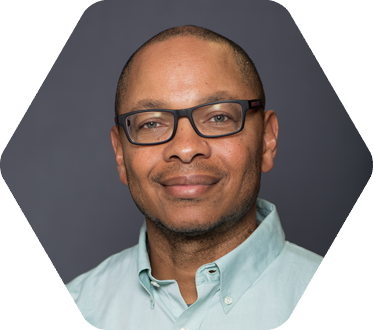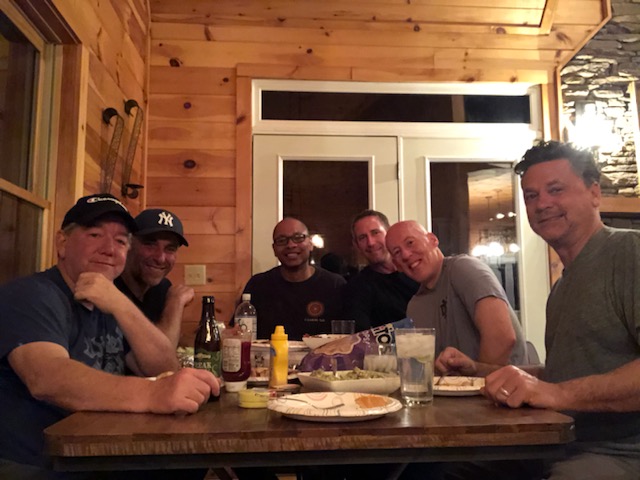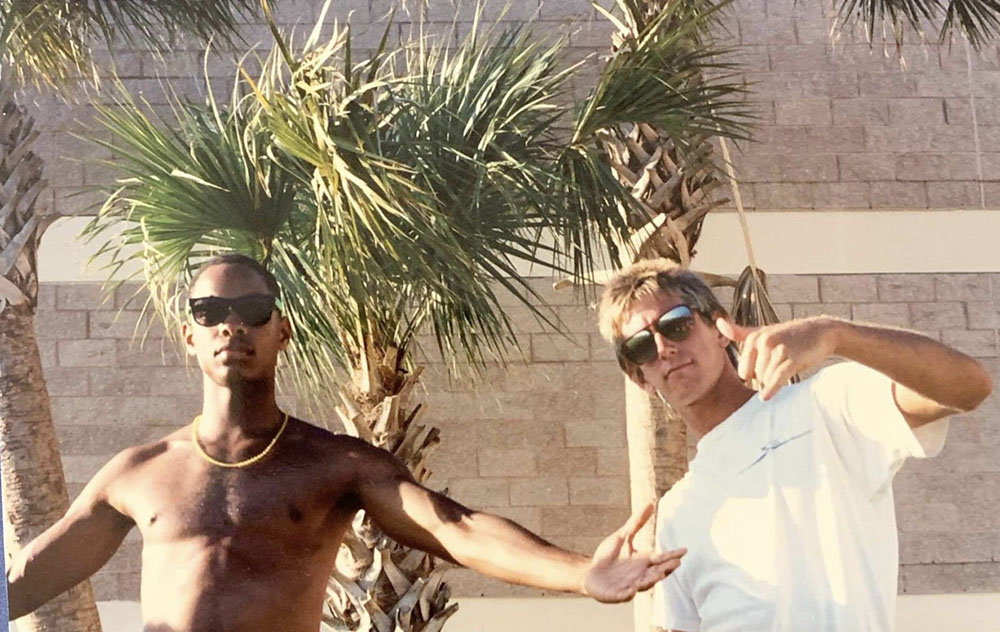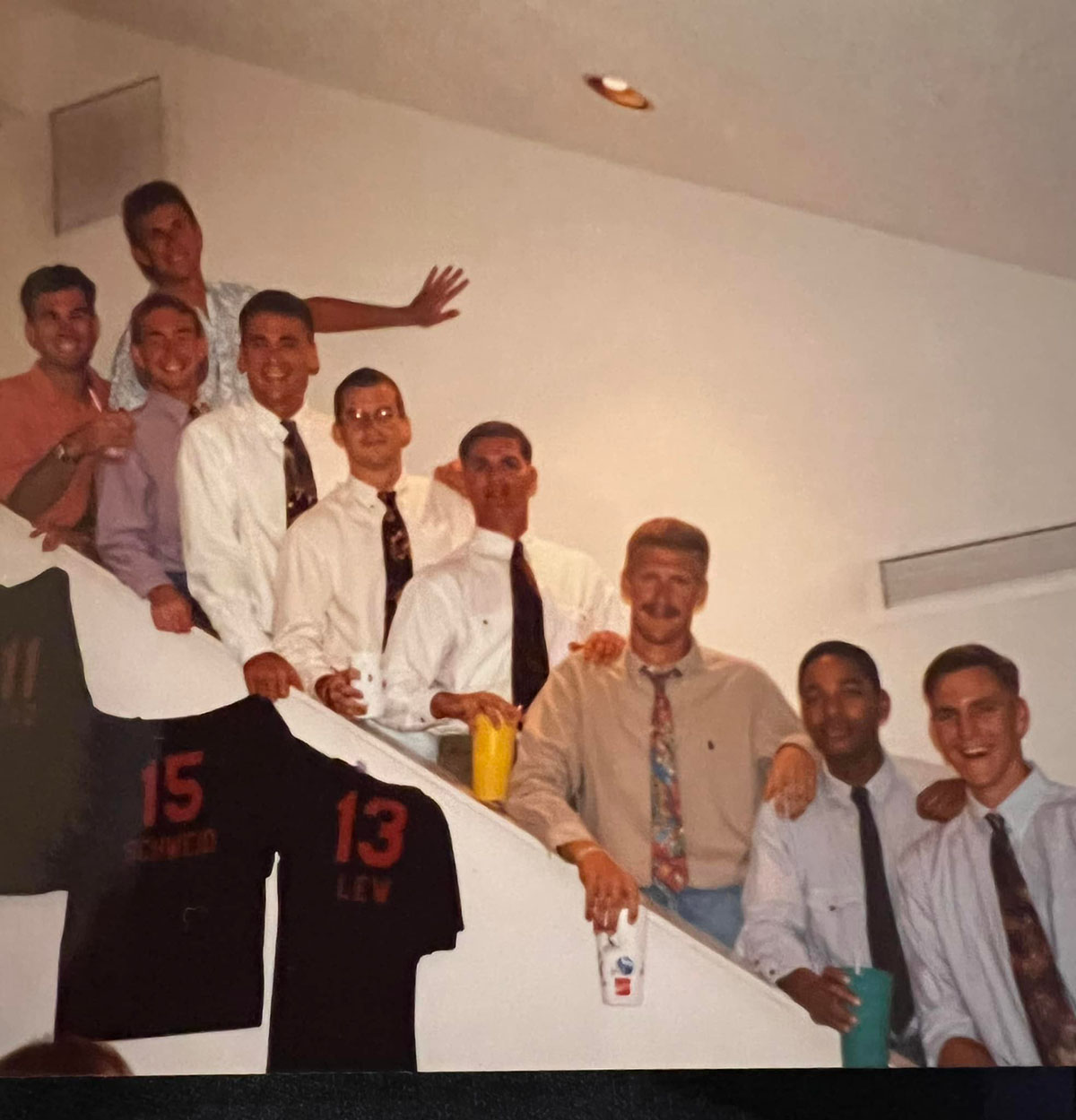Class of 1992
Mark Lewis ’92 recalls the moment during his first graduate school experience in engineering when, frustrated with the narrow scope of his program, he called David Kerr, an Eckerd mathematics professor and one of his mentors.
“David asked, ‘Is it the Ph.D. you don’t want, or is it just where you are?’ and I said, ‘I think it’s just where I am.’”
A few calls from Dr. Kerr later, and the Florida State University was ready to accept him as a transfer into a graduate program with a teaching assistantship. What could have been an obstacle in Mark’s academic career turned into another stepping stone in his journey.
“That level of mentorship was just amazing to me,” Mark says.“I felt most supported by the professors in math, and I found that to be a lifelong support.”


Nu Complex residents (left to right) Jeff Glade ’92, Jason Raymond ’93, Mark Lewis ’92, Ian Schweid ’92, Michael Hudanick ’91, Edward Pasque ’92 share memories of their time at Eckerd.
Mark went on to earn a master’s degree from FSU and a Ph.D. in industrial and systems engineering from Georgia Tech. Today, he is the Maxwell M. Upson Professor of Engineering at Cornell University, a path he says was made easier by the guidance and education he received at Eckerd as a double major in mathematics and political science. He still receives support today from current and former faculty—including Professors David Kerr, Gerald Junevicus, Walter Walker ’74, and Tony Brunello. Beyond academia, he met his wife, Wendy Wilcox ’94, at Eckerd, as well as many lifelong friends.
“The technical training I got at Eckerd was top-notch,” he says. “Once I got into the trenches of learning at the Ph.D. level, I was as prepared as any of the students who came from more well-known schools.”
Mark ended up at Eckerd through a series of fortuitous circumstances. He grew up in the Florida Panhandle and had never heard of Eckerd, but a local businessman who was a Presbyterian called the Eckerd basketball coach and suggested he come see Mark play.
Eckerd recruited Mark, who wanted to play basketball at the college level. He was intrigued by the 3-2 Engineering program as well as the breadth of the liberal arts education.
“I was impressed with the fact that I didn’t have to make a decision about what I wanted to do,” he says. “I could have three degrees that had nothing to do with each other.”
Studying at Eckerd, Mark enjoyed the opportunity to form relationships with people from different backgrounds, means and geographies—united by a love of learning. Friendships also formed a part in Mark’s career trajectory. During his time at FSU, he got a call from Eckerd classmate Quinton Zondervan ’92 (now an Eckerd trustee). Quinton had a fellowship at Bell Labs in New Jersey for minority Ph.D. students and told Mark, “My deal with all my friends who got this fellowship is that we tell someone else about it.”
Mark’s time at Bell Labs set the foundation for his research interests today. As a professor, he focuses his research on queueing—how information, parts or people form a line. Information stands in a line when it moves across communication networks, parts wait for milling or assembly in a manufacturing facility, and people wait in the hospital waiting room or at a call center. Information and parts do not generally leave the line—but people do. The time in line or patients leaving is a cost to the overall system. The mathematical modeling is different in each scenario, which is what keeps it interesting.
“The question becomes, ‘How do you make sure things work efficiently, so that less people abandon and waiting costs are minimized?’” he says.
“I’m most interested in the decisions,” he explains. “To me, the difference between science and engineering is in science, it might be observational, but in engineering, we are either building something new or making something better.”
He serves as the director for Cornell’s School of Operations Research and Information Engineering (ORIE) and has worked on various Diversity, Equity and Inclusion initiatives within the College of Engineering. He is proud to have been able to open doors for other Black academics. Mark was the first African American hire in Cornell’s School of ORIE and was involved in hiring the second faculty member 10 years ago. In helping to make that happen, Mark thinks back to Professor Walter Walker as one of his many mentors, who was the only Black professor he ever had in his many years of schooling.
“I want to see people who deserve an opportunity have it and I want to see people be able to grow,” he says, adding that his work in hiring and DEI initiatives has allowed him to continue to grow himself.
“As an Eckerd alum, I would say that one of the things a liberal arts education has taught me is that if you get siloed into a part of your work, you have to think about what broader impact can you have.”
His Eckerd relationships still form a central part of his life today, from Wendy, who Mark calls “one of the smartest people I know,” to many Eckerd classmates. Those relationships continue to grow, 30 years later. Several of his fellow alumni came back to Eckerd to see him receive the William H. Kadel Alumni Medal for Outstanding Career Achievement in February 2023. At the last minute, Mark couldn’t attend due to illness, but his friends Jeff Glade ’92 and Edward Pasque ’92 were there and brought their daughters to Eckerd. Those daughters met at the reunion, became fast friends and are now first-year students and roommates embarking on their own Eckerd journeys.
“If you have people that are close to you at your core, you don’t have to talk to them every day,” he says. “We reconnect, and it’s as if we’re sitting in the Nu dorms at Eckerd talking about what adventures our lives would bring again. I guess that is a part of what makes Eckerd special.”



